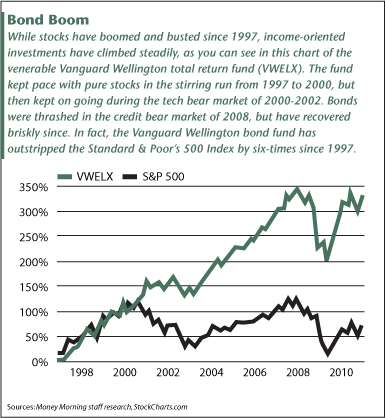With the stock market unsteady, don't overlook the value of adding bonds to your portfolio. They provide income and are more reliable than equities.
Indeed, bonds have had a strong run up in the past decade - so strong, in fact, that many investors are afraid they've entered bubble territory. But not Albert Edwards, chief strategist at the old-school French bank Societe Generale SA (PINK: SCGLY).
Edwards isn't your typical white-shoe analyst. Guys in his position tend to have a perpetually optimistic worldview. Since they are in the business of selling the dream, they need to talk up assets. But Edwards is an iconoclast who is known as one of the dourer professional forecasters.
Edwards was right on the money with his call in 1997 to focus on bonds as an "Ice Age" descended on stocks.
While stocks have boomed and busted since 1997, income-oriented investments have climbed steadily, as you can see in this chart of the venerable Vanguard Wellington total return fund (VWELX). The fund kept pace with pure stocks in the stirring run from 1997 to 2000, but then kept on going during the tech bear market of 2000-2002. Bonds were thrashed in the credit bear market of 2008, but have recovered briskly since. In fact, the Vanguard Wellington bond fund has outstripped the Standard & Poor's 500 Index by six-times since 1997.

I'm using the Wellington fund as a marker because it reflects yield in the return as well as price appreciation. But many people are now worried that all the recent attention and fresh capital inflows into yield instruments represent a bubble - a speculative excess fated to end badly.
Not so, says Edwards. He sees the global economy stumbling later this year with gross domestic product (GDP) slipping and deflation taking hold as demand wanes. In this environment, the relative out-performance of bonds versus stocks could continue for years to come, as occurred in similar circumstances in Japan.
"Equities will look increasingly cheap relative to expensive bonds," said Edwards.
For Edwards to be wrong, inflation needs to return to global financial markets. If it can sneak its way back into the picture, bond investors will start demanding higher yields to compensate. This would push bond prices down and put an end to the government credit advance as investors pour into the inflation protection provided by equities.
Of course, Edwards believes the return of inflation is a pipe dream. He is joined in that view by some of the world's top investors, including bond titan Bill Gross and value icon Jeremy Grantham, who see U.S. and European economic measures tipping toward weakness much earlier than normal at the start of a recovery, and heading straight for deflation. They have been buying bonds and high-yield stocks, which is one reason that credit, master limited partnerships (MLP), and utility stocks have been performing well.
Governments still have a lot of tools at their disposal to battle deflation, so bonds are not a sure bet by any means. But with anemic job growth, companies struggling to raise prices, and wage increases scant, the deflation threat remains an investable theme.
So keep holding bond positions such as the ones I recommend in the Strategic Advantage Yield Seeker portfolio and add on weakness.
Now if you are not sure if you want bonds or stocks in your portfolio, and want a mix, let me recommend two great choices that have served families well for generations. Many new fund companies and young managers have come and gone trying to steal their crown, but they dominate anyway. They're mutual funds, not exchange-traded funds (ETFs), but have the same low expenses.
The Vanguard Wellington Income (VWELX), which we've just discussed, keeps it really simple with a mix of 65% dividend-paying, high-quality stocks and 35% investment-grade bonds. The expense ratio is 0.34%, which is cheap. The annual dividend yield is 3%.
And the Vanguard Wellesley Income (VWINX) is much the same, except with an inverse mix: 65% bonds and 35% stocks. The expense ratio is 0.21%, which is even cheaper. The dividend yield is 4%.
You can own much fancier instruments, but few have stood the test of time like these.
Remember, the main reason that income-oriented investments perform better than stocks alone over long stretches of time is that they lose less in bear markets and gain about as much in bull markets. Funds like VWINX and VWELX provide a solid foundation for any portfolio, and can be used in equal proportion to obtain a 50/50 mix of stocks and bonds.
[Editor's Note: Money Morning Contributing Writer Jon D. Markman has a unique view of both the world economy and the global financial markets. With uncertainty the watchword and volatility the norm in today's markets, low-risk/high-profit investments will be tougher than ever to find.
It will take a seasoned guide to uncover those opportunities.
Markman is that guide.
In the face of what's been the toughest market for investors since the Great Depression, it's time to sweep away the uncertainty and eradicate the worry. That's why investors subscribe to Markman's Strategic Advantagenewsletter every week: He can see opportunity when other investors are blinded by worry.
Subscribe to Strategic Advantage and hire Markman to be your guide. For more information, please click here.]
News and Related Story Links:
- Money Morning:
Is the U.S. Economy Destined for Deflation? - Money Morning:
Emerging Stock Markets Thrive as U.S. Shares Tumble - Money Morning:
Defensive Investing: Beware of Municipal Bonds - Money Morning:
With Mid-Term Elections Looming, Will Democrats Fire Back with a Second Stimulus


